Criminology Essay: Principle of Innocent Until Proven Guilty Analysis
VerifiedAdded on 2022/08/01
|6
|1586
|25
Essay
AI Summary
This essay delves into the principle of 'innocent until proven guilty' within the criminal justice system, emphasizing its moral and legal foundation. It highlights the prosecution's responsibility to prove guilt beyond a reasonable doubt, a core tenet of international human rights. The discussion includes the impact of video conferencing and digital communication in courtrooms and prisons, examining how these technologies affect the perception of the accused's innocence. The essay references legal scholars and cases to analyze the principle's practical application and ethical considerations, including the role of evidence and adversarial trials. It concludes that the principle of innocence is crucial for the legality and public acceptance of the justice system, promoting ethical practices and ensuring fair treatment for all accused individuals. The essay references relevant articles and legal cases to support its arguments.
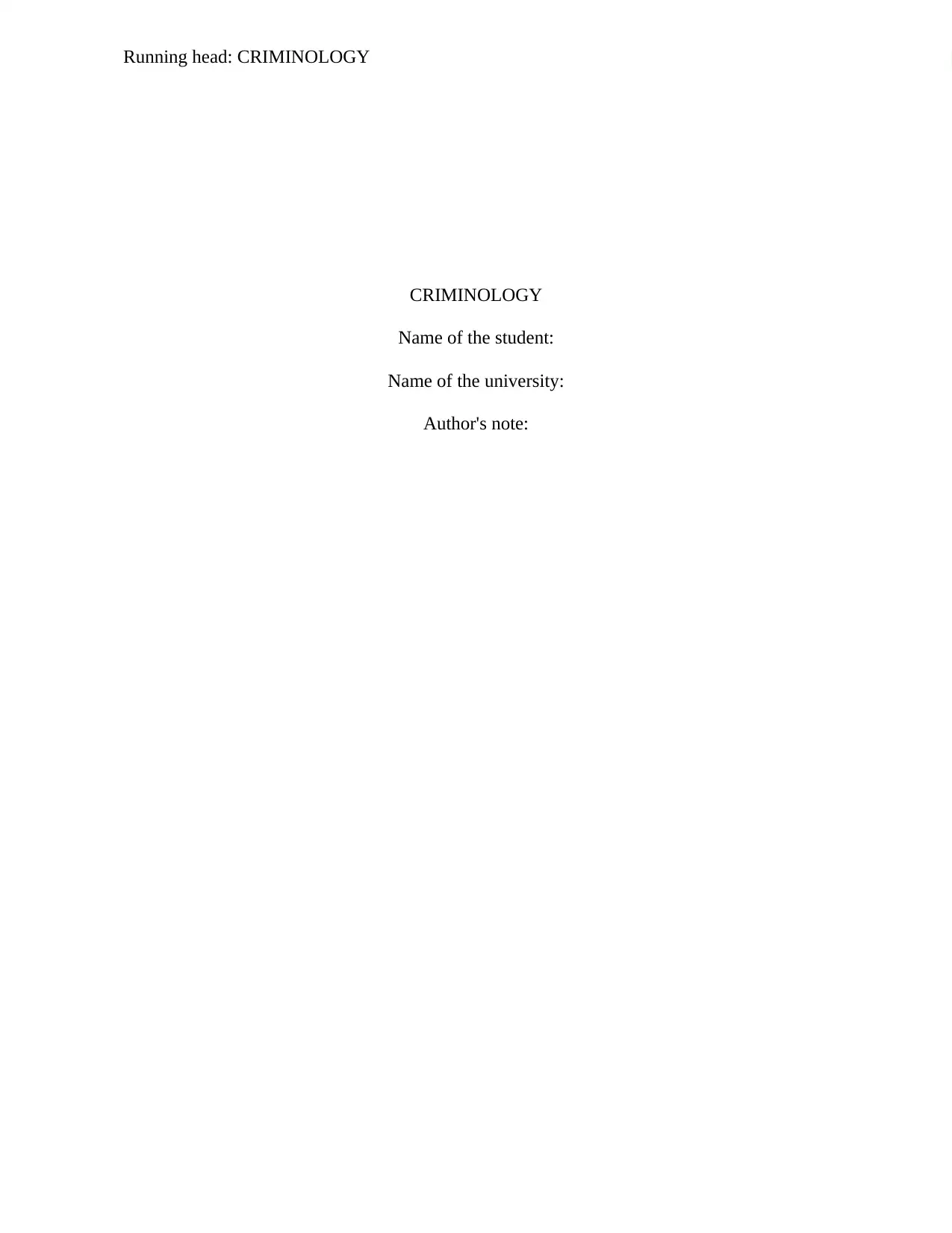
Running head: CRIMINOLOGY
0
CRIMINOLOGY
Name of the student:
Name of the university:
Author's note:
0
CRIMINOLOGY
Name of the student:
Name of the university:
Author's note:
Paraphrase This Document
Need a fresh take? Get an instant paraphrase of this document with our AI Paraphraser
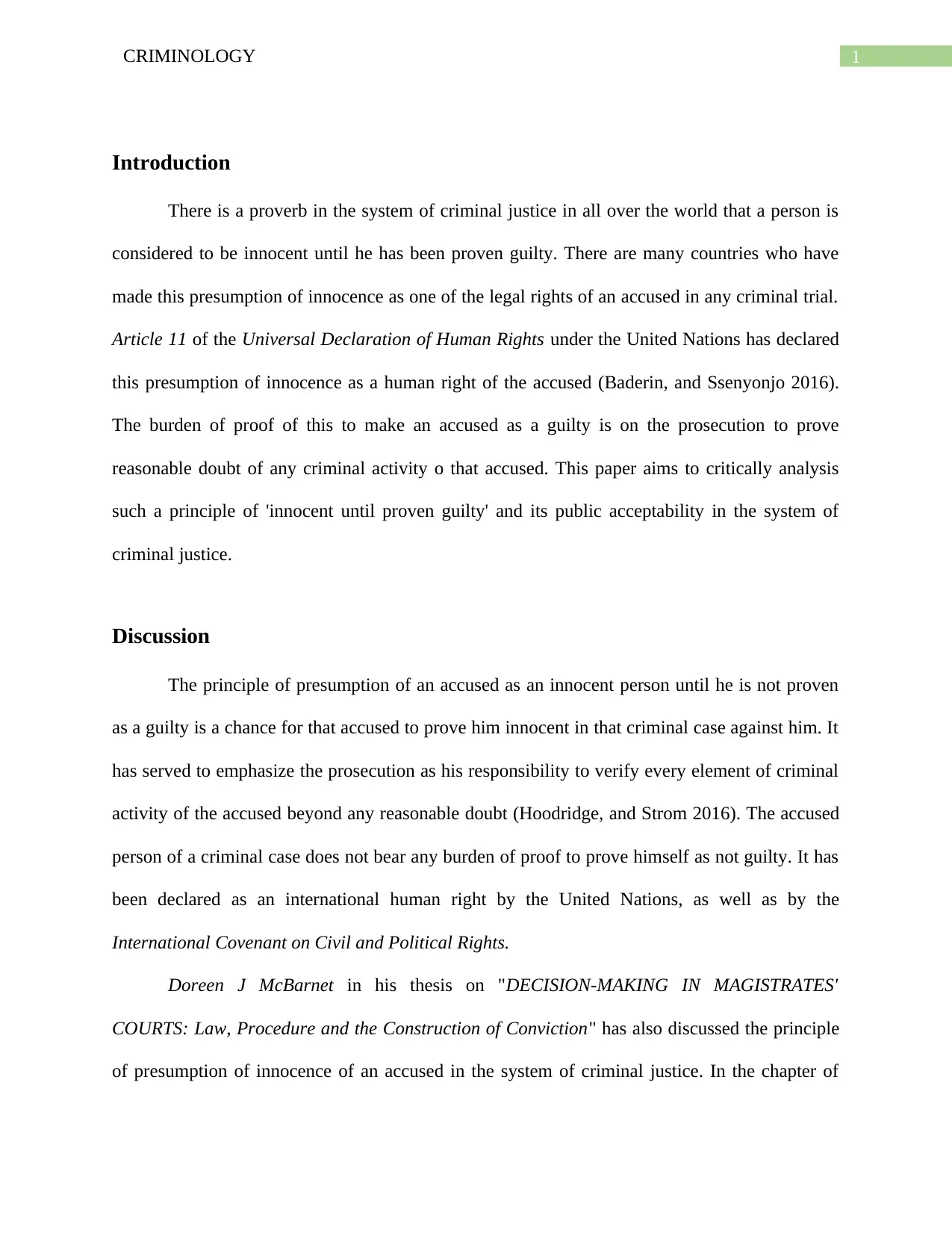
1CRIMINOLOGY
Introduction
There is a proverb in the system of criminal justice in all over the world that a person is
considered to be innocent until he has been proven guilty. There are many countries who have
made this presumption of innocence as one of the legal rights of an accused in any criminal trial.
Article 11 of the Universal Declaration of Human Rights under the United Nations has declared
this presumption of innocence as a human right of the accused (Baderin, and Ssenyonjo 2016).
The burden of proof of this to make an accused as a guilty is on the prosecution to prove
reasonable doubt of any criminal activity o that accused. This paper aims to critically analysis
such a principle of 'innocent until proven guilty' and its public acceptability in the system of
criminal justice.
Discussion
The principle of presumption of an accused as an innocent person until he is not proven
as a guilty is a chance for that accused to prove him innocent in that criminal case against him. It
has served to emphasize the prosecution as his responsibility to verify every element of criminal
activity of the accused beyond any reasonable doubt (Hoodridge, and Strom 2016). The accused
person of a criminal case does not bear any burden of proof to prove himself as not guilty. It has
been declared as an international human right by the United Nations, as well as by the
International Covenant on Civil and Political Rights.
Doreen J McBarnet in his thesis on "DECISION-MAKING IN MAGISTRATES'
COURTS: Law, Procedure and the Construction of Conviction" has also discussed the principle
of presumption of innocence of an accused in the system of criminal justice. In the chapter of
Introduction
There is a proverb in the system of criminal justice in all over the world that a person is
considered to be innocent until he has been proven guilty. There are many countries who have
made this presumption of innocence as one of the legal rights of an accused in any criminal trial.
Article 11 of the Universal Declaration of Human Rights under the United Nations has declared
this presumption of innocence as a human right of the accused (Baderin, and Ssenyonjo 2016).
The burden of proof of this to make an accused as a guilty is on the prosecution to prove
reasonable doubt of any criminal activity o that accused. This paper aims to critically analysis
such a principle of 'innocent until proven guilty' and its public acceptability in the system of
criminal justice.
Discussion
The principle of presumption of an accused as an innocent person until he is not proven
as a guilty is a chance for that accused to prove him innocent in that criminal case against him. It
has served to emphasize the prosecution as his responsibility to verify every element of criminal
activity of the accused beyond any reasonable doubt (Hoodridge, and Strom 2016). The accused
person of a criminal case does not bear any burden of proof to prove himself as not guilty. It has
been declared as an international human right by the United Nations, as well as by the
International Covenant on Civil and Political Rights.
Doreen J McBarnet in his thesis on "DECISION-MAKING IN MAGISTRATES'
COURTS: Law, Procedure and the Construction of Conviction" has also discussed the principle
of presumption of innocence of an accused in the system of criminal justice. In the chapter of
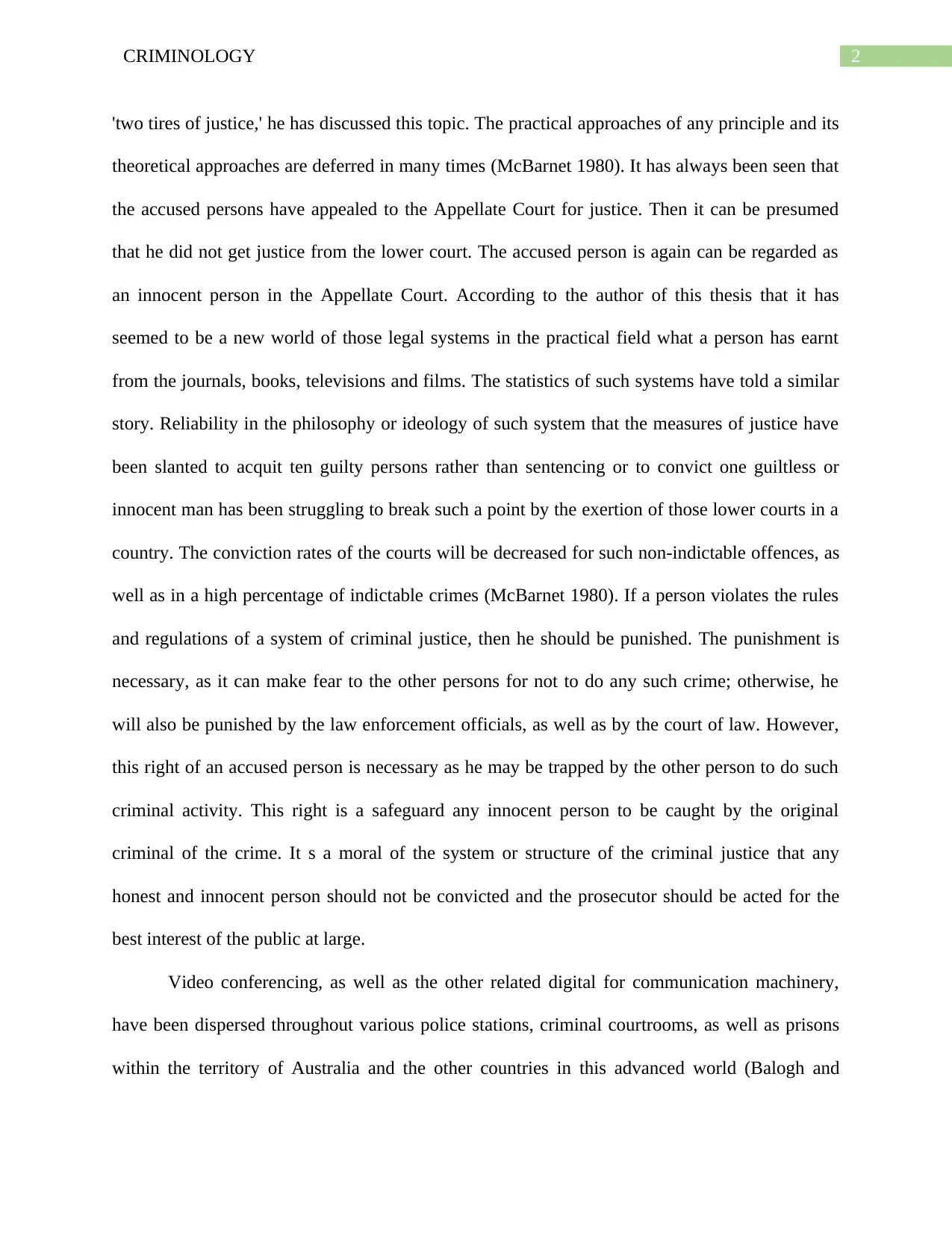
2CRIMINOLOGY
'two tires of justice,' he has discussed this topic. The practical approaches of any principle and its
theoretical approaches are deferred in many times (McBarnet 1980). It has always been seen that
the accused persons have appealed to the Appellate Court for justice. Then it can be presumed
that he did not get justice from the lower court. The accused person is again can be regarded as
an innocent person in the Appellate Court. According to the author of this thesis that it has
seemed to be a new world of those legal systems in the practical field what a person has earnt
from the journals, books, televisions and films. The statistics of such systems have told a similar
story. Reliability in the philosophy or ideology of such system that the measures of justice have
been slanted to acquit ten guilty persons rather than sentencing or to convict one guiltless or
innocent man has been struggling to break such a point by the exertion of those lower courts in a
country. The conviction rates of the courts will be decreased for such non-indictable offences, as
well as in a high percentage of indictable crimes (McBarnet 1980). If a person violates the rules
and regulations of a system of criminal justice, then he should be punished. The punishment is
necessary, as it can make fear to the other persons for not to do any such crime; otherwise, he
will also be punished by the law enforcement officials, as well as by the court of law. However,
this right of an accused person is necessary as he may be trapped by the other person to do such
criminal activity. This right is a safeguard any innocent person to be caught by the original
criminal of the crime. It s a moral of the system or structure of the criminal justice that any
honest and innocent person should not be convicted and the prosecutor should be acted for the
best interest of the public at large.
Video conferencing, as well as the other related digital for communication machinery,
have been dispersed throughout various police stations, criminal courtrooms, as well as prisons
within the territory of Australia and the other countries in this advanced world (Balogh and
'two tires of justice,' he has discussed this topic. The practical approaches of any principle and its
theoretical approaches are deferred in many times (McBarnet 1980). It has always been seen that
the accused persons have appealed to the Appellate Court for justice. Then it can be presumed
that he did not get justice from the lower court. The accused person is again can be regarded as
an innocent person in the Appellate Court. According to the author of this thesis that it has
seemed to be a new world of those legal systems in the practical field what a person has earnt
from the journals, books, televisions and films. The statistics of such systems have told a similar
story. Reliability in the philosophy or ideology of such system that the measures of justice have
been slanted to acquit ten guilty persons rather than sentencing or to convict one guiltless or
innocent man has been struggling to break such a point by the exertion of those lower courts in a
country. The conviction rates of the courts will be decreased for such non-indictable offences, as
well as in a high percentage of indictable crimes (McBarnet 1980). If a person violates the rules
and regulations of a system of criminal justice, then he should be punished. The punishment is
necessary, as it can make fear to the other persons for not to do any such crime; otherwise, he
will also be punished by the law enforcement officials, as well as by the court of law. However,
this right of an accused person is necessary as he may be trapped by the other person to do such
criminal activity. This right is a safeguard any innocent person to be caught by the original
criminal of the crime. It s a moral of the system or structure of the criminal justice that any
honest and innocent person should not be convicted and the prosecutor should be acted for the
best interest of the public at large.
Video conferencing, as well as the other related digital for communication machinery,
have been dispersed throughout various police stations, criminal courtrooms, as well as prisons
within the territory of Australia and the other countries in this advanced world (Balogh and
⊘ This is a preview!⊘
Do you want full access?
Subscribe today to unlock all pages.

Trusted by 1+ million students worldwide
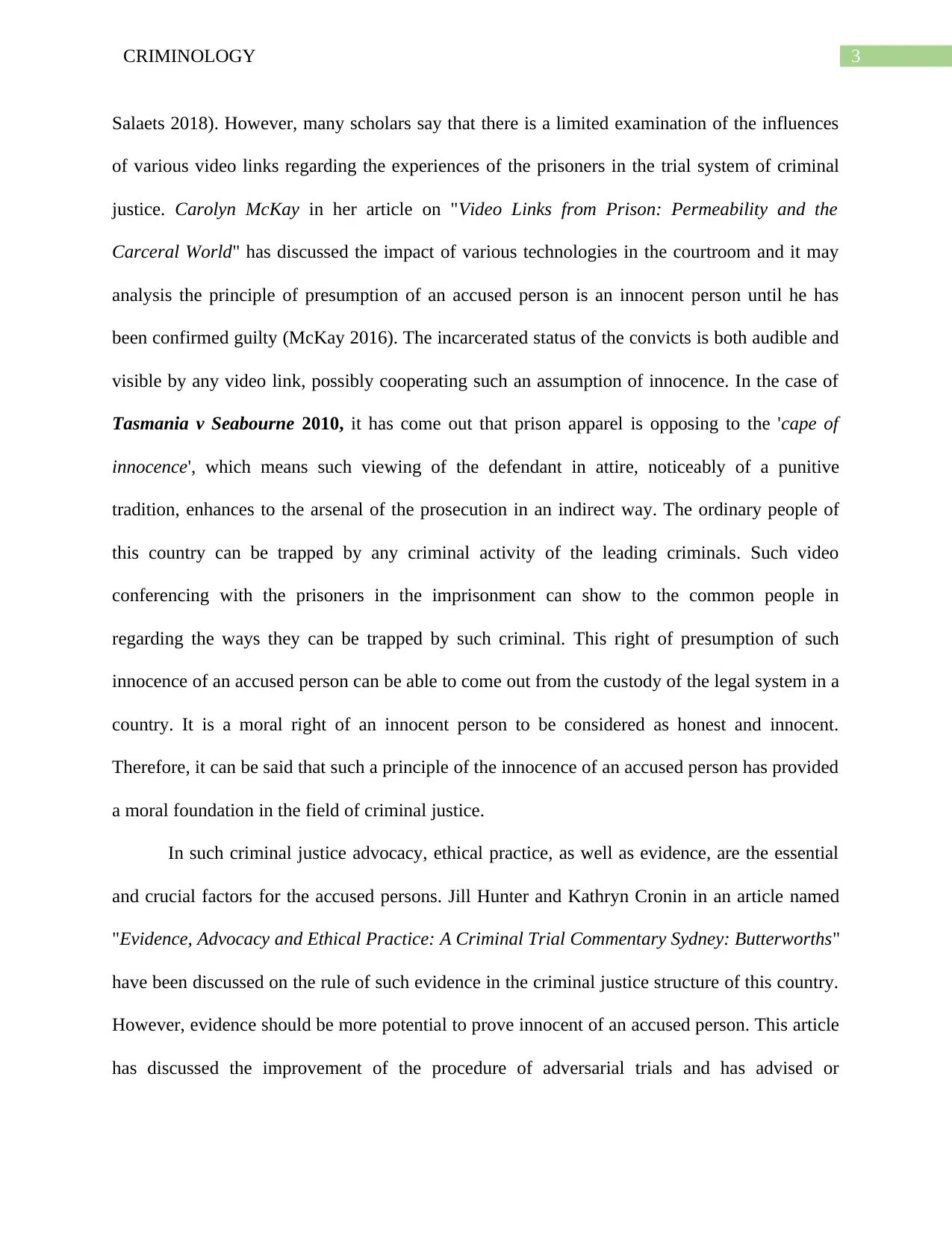
3CRIMINOLOGY
Salaets 2018). However, many scholars say that there is a limited examination of the influences
of various video links regarding the experiences of the prisoners in the trial system of criminal
justice. Carolyn McKay in her article on "Video Links from Prison: Permeability and the
Carceral World" has discussed the impact of various technologies in the courtroom and it may
analysis the principle of presumption of an accused person is an innocent person until he has
been confirmed guilty (McKay 2016). The incarcerated status of the convicts is both audible and
visible by any video link, possibly cooperating such an assumption of innocence. In the case of
Tasmania v Seabourne 2010, it has come out that prison apparel is opposing to the 'cape of
innocence', which means such viewing of the defendant in attire, noticeably of a punitive
tradition, enhances to the arsenal of the prosecution in an indirect way. The ordinary people of
this country can be trapped by any criminal activity of the leading criminals. Such video
conferencing with the prisoners in the imprisonment can show to the common people in
regarding the ways they can be trapped by such criminal. This right of presumption of such
innocence of an accused person can be able to come out from the custody of the legal system in a
country. It is a moral right of an innocent person to be considered as honest and innocent.
Therefore, it can be said that such a principle of the innocence of an accused person has provided
a moral foundation in the field of criminal justice.
In such criminal justice advocacy, ethical practice, as well as evidence, are the essential
and crucial factors for the accused persons. Jill Hunter and Kathryn Cronin in an article named
"Evidence, Advocacy and Ethical Practice: A Criminal Trial Commentary Sydney: Butterworths"
have been discussed on the rule of such evidence in the criminal justice structure of this country.
However, evidence should be more potential to prove innocent of an accused person. This article
has discussed the improvement of the procedure of adversarial trials and has advised or
Salaets 2018). However, many scholars say that there is a limited examination of the influences
of various video links regarding the experiences of the prisoners in the trial system of criminal
justice. Carolyn McKay in her article on "Video Links from Prison: Permeability and the
Carceral World" has discussed the impact of various technologies in the courtroom and it may
analysis the principle of presumption of an accused person is an innocent person until he has
been confirmed guilty (McKay 2016). The incarcerated status of the convicts is both audible and
visible by any video link, possibly cooperating such an assumption of innocence. In the case of
Tasmania v Seabourne 2010, it has come out that prison apparel is opposing to the 'cape of
innocence', which means such viewing of the defendant in attire, noticeably of a punitive
tradition, enhances to the arsenal of the prosecution in an indirect way. The ordinary people of
this country can be trapped by any criminal activity of the leading criminals. Such video
conferencing with the prisoners in the imprisonment can show to the common people in
regarding the ways they can be trapped by such criminal. This right of presumption of such
innocence of an accused person can be able to come out from the custody of the legal system in a
country. It is a moral right of an innocent person to be considered as honest and innocent.
Therefore, it can be said that such a principle of the innocence of an accused person has provided
a moral foundation in the field of criminal justice.
In such criminal justice advocacy, ethical practice, as well as evidence, are the essential
and crucial factors for the accused persons. Jill Hunter and Kathryn Cronin in an article named
"Evidence, Advocacy and Ethical Practice: A Criminal Trial Commentary Sydney: Butterworths"
have been discussed on the rule of such evidence in the criminal justice structure of this country.
However, evidence should be more potential to prove innocent of an accused person. This article
has discussed the improvement of the procedure of adversarial trials and has advised or
Paraphrase This Document
Need a fresh take? Get an instant paraphrase of this document with our AI Paraphraser
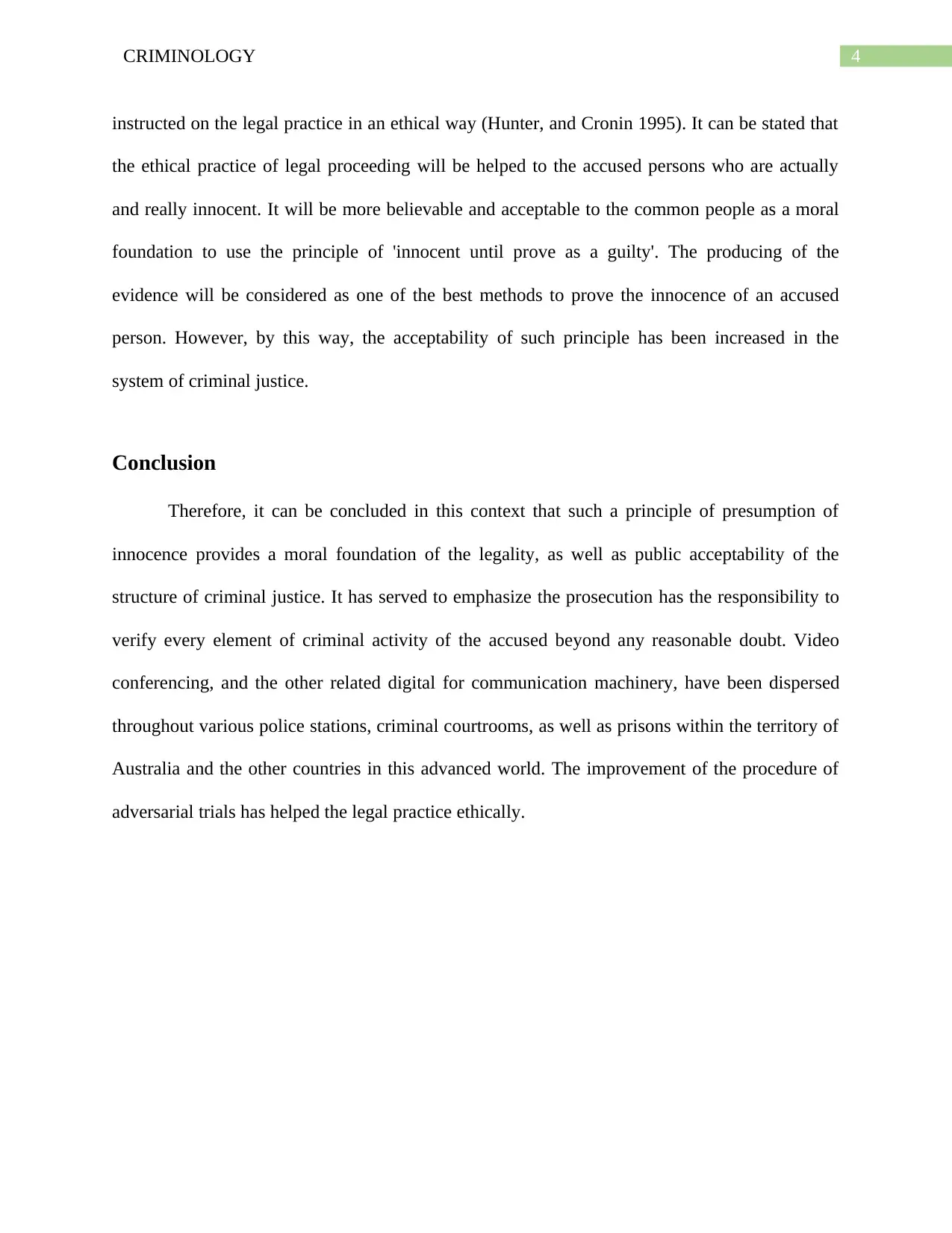
4CRIMINOLOGY
instructed on the legal practice in an ethical way (Hunter, and Cronin 1995). It can be stated that
the ethical practice of legal proceeding will be helped to the accused persons who are actually
and really innocent. It will be more believable and acceptable to the common people as a moral
foundation to use the principle of 'innocent until prove as a guilty'. The producing of the
evidence will be considered as one of the best methods to prove the innocence of an accused
person. However, by this way, the acceptability of such principle has been increased in the
system of criminal justice.
Conclusion
Therefore, it can be concluded in this context that such a principle of presumption of
innocence provides a moral foundation of the legality, as well as public acceptability of the
structure of criminal justice. It has served to emphasize the prosecution has the responsibility to
verify every element of criminal activity of the accused beyond any reasonable doubt. Video
conferencing, and the other related digital for communication machinery, have been dispersed
throughout various police stations, criminal courtrooms, as well as prisons within the territory of
Australia and the other countries in this advanced world. The improvement of the procedure of
adversarial trials has helped the legal practice ethically.
instructed on the legal practice in an ethical way (Hunter, and Cronin 1995). It can be stated that
the ethical practice of legal proceeding will be helped to the accused persons who are actually
and really innocent. It will be more believable and acceptable to the common people as a moral
foundation to use the principle of 'innocent until prove as a guilty'. The producing of the
evidence will be considered as one of the best methods to prove the innocence of an accused
person. However, by this way, the acceptability of such principle has been increased in the
system of criminal justice.
Conclusion
Therefore, it can be concluded in this context that such a principle of presumption of
innocence provides a moral foundation of the legality, as well as public acceptability of the
structure of criminal justice. It has served to emphasize the prosecution has the responsibility to
verify every element of criminal activity of the accused beyond any reasonable doubt. Video
conferencing, and the other related digital for communication machinery, have been dispersed
throughout various police stations, criminal courtrooms, as well as prisons within the territory of
Australia and the other countries in this advanced world. The improvement of the procedure of
adversarial trials has helped the legal practice ethically.
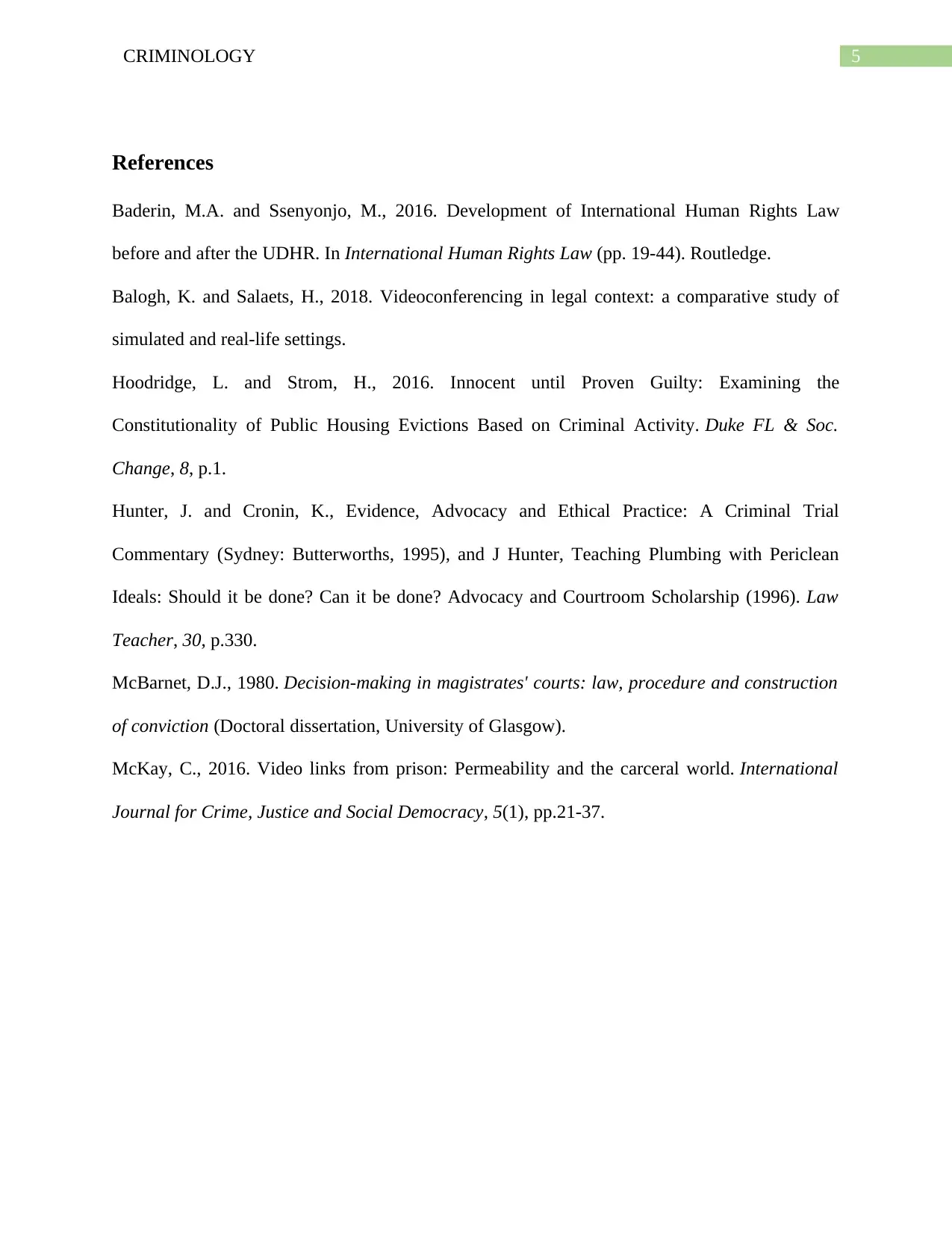
5CRIMINOLOGY
References
Baderin, M.A. and Ssenyonjo, M., 2016. Development of International Human Rights Law
before and after the UDHR. In International Human Rights Law (pp. 19-44). Routledge.
Balogh, K. and Salaets, H., 2018. Videoconferencing in legal context: a comparative study of
simulated and real-life settings.
Hoodridge, L. and Strom, H., 2016. Innocent until Proven Guilty: Examining the
Constitutionality of Public Housing Evictions Based on Criminal Activity. Duke FL & Soc.
Change, 8, p.1.
Hunter, J. and Cronin, K., Evidence, Advocacy and Ethical Practice: A Criminal Trial
Commentary (Sydney: Butterworths, 1995), and J Hunter, Teaching Plumbing with Periclean
Ideals: Should it be done? Can it be done? Advocacy and Courtroom Scholarship (1996). Law
Teacher, 30, p.330.
McBarnet, D.J., 1980. Decision-making in magistrates' courts: law, procedure and construction
of conviction (Doctoral dissertation, University of Glasgow).
McKay, C., 2016. Video links from prison: Permeability and the carceral world. International
Journal for Crime, Justice and Social Democracy, 5(1), pp.21-37.
References
Baderin, M.A. and Ssenyonjo, M., 2016. Development of International Human Rights Law
before and after the UDHR. In International Human Rights Law (pp. 19-44). Routledge.
Balogh, K. and Salaets, H., 2018. Videoconferencing in legal context: a comparative study of
simulated and real-life settings.
Hoodridge, L. and Strom, H., 2016. Innocent until Proven Guilty: Examining the
Constitutionality of Public Housing Evictions Based on Criminal Activity. Duke FL & Soc.
Change, 8, p.1.
Hunter, J. and Cronin, K., Evidence, Advocacy and Ethical Practice: A Criminal Trial
Commentary (Sydney: Butterworths, 1995), and J Hunter, Teaching Plumbing with Periclean
Ideals: Should it be done? Can it be done? Advocacy and Courtroom Scholarship (1996). Law
Teacher, 30, p.330.
McBarnet, D.J., 1980. Decision-making in magistrates' courts: law, procedure and construction
of conviction (Doctoral dissertation, University of Glasgow).
McKay, C., 2016. Video links from prison: Permeability and the carceral world. International
Journal for Crime, Justice and Social Democracy, 5(1), pp.21-37.
⊘ This is a preview!⊘
Do you want full access?
Subscribe today to unlock all pages.

Trusted by 1+ million students worldwide
1 out of 6
Related Documents
Your All-in-One AI-Powered Toolkit for Academic Success.
+13062052269
info@desklib.com
Available 24*7 on WhatsApp / Email
![[object Object]](/_next/static/media/star-bottom.7253800d.svg)
Unlock your academic potential
Copyright © 2020–2025 A2Z Services. All Rights Reserved. Developed and managed by ZUCOL.





